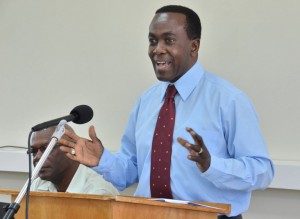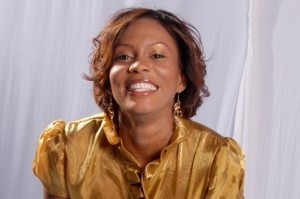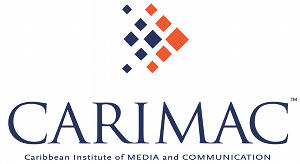
Watergate, CARIMAC and the Pursuit of Truth
May 12th, 2015
I arrived early and made my way around rows of still empty seats. As I sat down, I noticed the evening sun was still shining on the tops of the hills surrounding the Mona Campus, which was already in shadow. I took a photograph of the hillside with my new camera – my very first – but since it is higher resolution than my previous photos, it cannot be accommodated here.
But I digress. This was the launch of the CARIMAC Times 2015, an annual publication of the students of the Caribbean Institute of Media and Communication (CARIMAC) at the University of the West Indies (UWI). For some time, hints about the event had been tweeted widely, and anticipation was growing. Event planner Rosheika Grant (who buzzed around in a bright blue dress – yes, she’s a Chelsea supporter) had spent much time and energy on the launch, and it paid off. The provocative title, and the inspiration for the publication was “Watergate,” suggesting that investigative journalism was the theme.
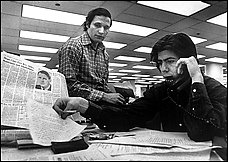
Bob Woodward, left, and Carl Bernstein were in their twenties when they began investigating the Watergate cover-up. They subsequently wrote a book about their investigations, “All The President’s Men,” which was made into a highly successful film starring Dustin Hoffman and Robert Redford. (Ken Feil – TWP)
The title brought back a personal memory. The first time I visited Washington, DC, I walked from my hotel to the Kennedy Center. I was preoccupied with crossing a busy road, when reaching the other side, I looked up and realized that there, smack in front of me, was Watergate. Yes, the Watergate, where on June 17, 1972 a burglary took place at the Democratic National Committee Headquarters. It was not your average, run of the mill burglary. The resulting scandal led to Richard Nixon becoming the first U.S. President to resign from office in August, 1974. Two young Washington Post reporters, Bob Woodward and Carl Bernstein, who later won the Pulitzer prize for their reporting, were instrumental in bringing the Republican Party’s machinations and the attempted cover-up to light. Besides “Deep Throat,” the high-ranking FBI official who was a key confidential source, the courageous young journalists unearthed tapes and documents that helped them put the story together. It was an astonishing journalistic achievement.
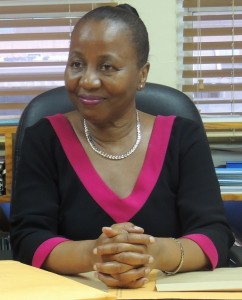
Dr Corinne Barnes is Coordinator of the Print and Online Journalism Specialization and Lecturer at the Caribbean Institute of Media and Communication (CARIMAC) at the University of the West Indies.
Back to the Watergate-inspired student publication. I spoke with a smiling Dr. Corinne Barnes, who has been teaching the final year Print and Online Journalism undergraduate students in Media Research and Production as part of their B.A. Journalism degree. “Team Watergate” consists of fifteen students (fourteen women and one man – not much gender balance, I am afraid!) who researched, interviewed and wrote the articles over a six month period, designed the publication and obtained sponsorship and advertising to get it published. They did it all themselves, Dr. Barnes told me proudly, with no input from her. The CARIMAC Times was the students’ “baby.”
Editor-in-Chief Kemisha Anderson was also proud of her team and their achievement. She used words like “passion” and “curiosity” – two essential qualities for the investigative journalist, I would say. CARIMAC Director Professor Hopeton Dunn was also very impressed by the students’ initiative (and I would add, their courage in tackling some challenging topics).
So, what did they write about? Ms. Anderson herself wrote a powerful piece on gender-based violence headlined “Young, Independent and Abused.” No, there is no “typical” victim of domestic abuse, she discovered. Educated women – and students on her very own campus – are at risk; and partner abuse is certainly an issue on the UWI campus as it is at universities worldwide. Because of the stigma, fear and denial, it is a hard subject to investigate. So is the secretive business of tattooing among minors (described in a piece artfully entitled “Minors ‘Ink'” by Jediael Carter). I confess I never knew this was practiced. Shanique Simpson went “undercover,” in heavy disguise, to investigate an illegal gambling operation in deep rural Jamaica; while Javene Skyers summoned up some nerve to look into how Asian business people in downtown Kingston protect their wholesale outlets from extortionists. Managing Editor Penda Honeyghan followed the trials and tribulations of Jamaicans studying overseas. Each article is fascinating and well researched.
The students invited investigative journalist, attorney-at-law and radio talk show host Emily Shields to be their guest speaker. With thirteen years of experience in the broadcast media, Shields did not attend journalism school. “I learnt on the job,” she said simply. In various ways, she emphasized the importance of staying focused, with a single-minded determination, “in pursuit of the truth.” She touched on issues of fairness and balance, attention to detail – and hard work and application.
Another important lesson the students must learn when they are out there, in the media jungle, is not to “show off.” This was a good point coming from Shields, herself a high profile journalist with an attractive appearance and personality. “Don’t get caught up in your own hype,” she said firmly. Stay grounded, always be prepared, always be sensitive to the people you are reporting on.
So, what of the future of investigative journalism in Jamaica? It’s hard to say. One of Emily Shields’ comments was telling. “We pull back from covering stories when we realize who is involved,” she observed, adding,“Don’t stop until there’s a resolution” to the story. Yes, Jamaican journalists do “pull back” on a regular basis, for fear of lawsuits; or their editors pull them back. It’s called self-censorship. Journalists may be forced to withdraw, curtail or edit out sections of their story before there is a resolution, leaving the story dangling, in mid-air, with many question marks in its wake. We know this happens.
“Create a niche for investigative journalism in Jamaica,” Shields urged. She feels it is a duty to do so: “These are the lives of people.”
And yet… Are Jamaican journalists ready to pursue the truth, right to the very end, wherever it might lead? I have my doubts.
Would you like to read the CARIMAC Times 2015 online? Then go to http://carimac-times-2015.webflow.io There is a section where you can leave comments on each story.
Tags: Caribbean, Caribbean Institute for Media and Communication, CARIMAC, Corinne Barnes, Emily Shields, gender-based violence, investigative journalism, journalism, United States, University of the West Indies, Watergate
The Gleaner reserves the right not to publish comments that may be deemed libelous, derogatory or indecent.
To respond to The Gleaner please use the feedback form.
- We Are the Zoomers
- Living Online with Humans and Birds: NAOC 2020
- Human Trafficking and the Problem of Public Education
- Down Memory Lane
- Are We Ready to Recover from COVID-19?
- Road Safety Matters: Is Your Vehicle Safe?
- Sexual Harassment, Me Too, and the Minister’s Disturbing Giggle
- The Vulnerable Senior Citizens, Private Care Homes and COVID-19
- A Muddle Over Masks
- Here is Something Life-Saving You Can Do: Give Blood!

